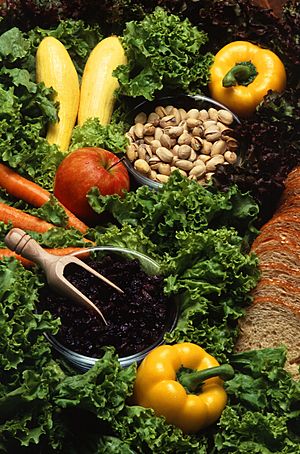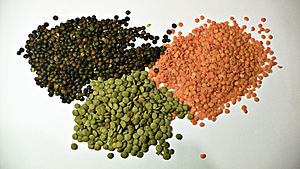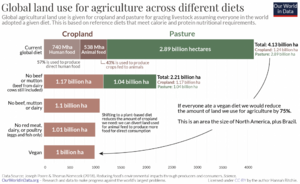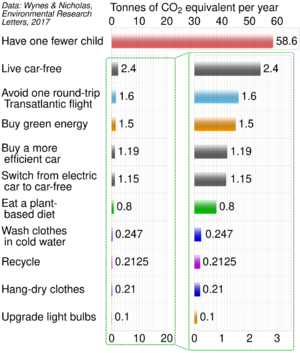Veganism facts for kids
Veganism is a way of living that tries to avoid using animals for anything. This means not eating animal products and often not using things like leather or wool. Vegans believe in being kind to animals and protecting their rights.
People who are vegan do not eat meat, eggs, or dairy products like milk and cheese. Some vegans also choose not to eat honey. Beyond food, many vegans try to avoid products made from animals, such as leather, wool, feathers, or pearls. They also try not to buy products that have been tested on animals.
Vegans enjoy a wide variety of foods like fruits, vegetables, beans, grains, nuts, and seeds. They can also eat many tasty foods made from plants, such as vegan sweets, vegan cheese, and vegan cakes. The word "vegan" was created by Donald Watson in 1944.
Contents
Why Choose a Vegan Lifestyle?
People become vegan for many different reasons.
Caring for Animals
One big reason is that people disagree with how animals are treated in modern farming. They want to reduce animal suffering.
Health Benefits
Some people choose veganism for health reasons, believing it can be a very healthy way to eat.
Protecting Our Planet
Many vegans are concerned about the environment. Raising animals for food uses a lot of land, water, and other resources. For example, it takes a lot of grain to produce a small amount of meat. By choosing plant-based foods, we can save resources. Also, using many antibiotics in animal farming can make bacteria stronger, which is a worry for human health.
Helping Others
Some people become vegan because they want to help with world hunger. Growing plants directly for people to eat uses fewer resources than growing plants to feed animals.
Special Vegan Diets
- Raw veganism: Some vegans only eat foods that have not been cooked.
- Fruitarianism: This is a very strict type of veganism where people only eat fruits, nuts, and seeds that can be picked without harming the plant.
Important Nutrients for Vegans
Vegans need to make sure they get enough vitamin B12. This vitamin is not easily found in plant foods. Things like tempeh or seaweed are not reliable sources. Vegans often take supplements or eat foods that have vitamin B12 added to them.
It's also important for vegans to get enough Vitamin D. Since dairy products often have vitamin D added, vegans can get it from supplements or by spending time outdoors in the sun.
Is a Vegan Diet Healthy?
Some people think that being vegan is not healthy. However, a well-planned vegan diet can provide all the nutrients a person needs to be healthy. It just takes a bit more planning to make sure you get everything, because there are fewer food choices compared to a diet that includes animal products.
Different Ways to Be Vegan
Veganism is more than just a diet; it's often a way of thinking about animals and the world.
Ethical Veganism
Ethical veganism is about trying to avoid using animals for food, clothing, or any other purpose as much as possible. Ethical vegans want to reduce animal suffering and cruelty. They believe that animals should not be used by humans.
Some ethical vegans also point out that working conditions in places where animals are processed for food can be very difficult for people.
Dietary Veganism
Some people only follow the food rules of veganism. They do not eat any products that come from animals. This is sometimes called a "plant-based diet." Some people believe that true veganism includes more than just food choices.
Environmental Veganism
Environmental vegans focus on protecting the planet. They avoid animal products because they believe that fishing, hunting, and especially large-scale animal farming are not good for the environment.
How Veganism Can Help the Environment
Studies show that choosing a vegan diet can have many positive effects on our planet.
- Less Land Use: A lot of the Earth's land is used for raising animals for food. If more people became vegan, much less land would be needed for farming. This could free up land for nature to grow back.
- Fewer Greenhouse Gases: Raising animals, especially cows, chickens, and pigs, creates a lot of greenhouse gases, which contribute to climate change. Plant-based foods generally create fewer emissions.
- Protecting Biodiversity: The demand for meat leads to cutting down forests and destroying natural habitats, which causes many animal and plant species to disappear. A shift to plant-based diets could help protect these species.
- Saving Water: Raising animals uses a huge amount of water. Eating plants directly uses much less water.
Many scientists and reports from organizations like the United Nations have suggested that moving towards plant-based diets is one of the best ways to reduce our impact on Earth. Even just eating fewer animal products can make a big difference!
Who Are Vegans?
In the United States, about 1 in 10 adults consider themselves vegan or vegetarian. Here's a look at some groups of people who are vegan:
| Group | Male | Female | Sample size | ||
|---|---|---|---|---|---|
| Gender | 21% | 79% | Over 8000 | ||
| Religion (general) | Atheist or Agnostic | Spiritual but not religious | Major religion | Over 8000 | |
| 43% | 45% | 11% | |||
| Political views | Liberal | Apolitical | Conservative | Over 8000 | |
| 62% | 33% | 5% | |||
| Main reason for being vegan | Animal rights | Other | Over 8000 | ||
| 69% | 31% | ||||
| Age | 18 to 25 | 24 to 35 | 35 to 44 | 45 to 54 | 287, American |
| 22% | 35% | 21% | 14% |
Vegan Rights and Protections
In some places, vegans have certain rights and legal protections. This means they might be protected from unfair treatment or have the right to vegan food options.
- In Germany, a vegan police officer was given extra money for food because vegan options were not provided at work.
- In Portugal, since 2017, public cafeterias (like in schools or prisons) must offer at least one vegan meal option.
- In the United Kingdom, a court decided in 2020 that "ethical veganism" is a protected belief under the law. This means people cannot be unfairly treated because they are ethical vegans.
Symbols of Veganism

There are different symbols used to represent veganism. Some are used on food packaging to show that a product does not contain any animal ingredients. Other symbols are used by vegans themselves or by groups that support animal rights.
Related pages
Images for kids
-
Fruitlands, a short-lived vegan community established in 1844.
-
Barbara Moore attended the first meeting of the Vegan Society.
-
Veganz in Berlin, Europe's first vegan supermarket.
-
Giuseppe Arcimboldo, Vertumno (1590).
-
Vegan soap made from olive oil; soap is usually made from animal fat.
-
Warm tofu (soybean curd) with garlic sauce.
-
Rice and beans is a common vegan protein combination.
-
Tahini miso soup with brown rice, turnips, squash, radishes and nori (an edible seaweed). Vegans need to consume regularly fortified foods or supplements containing B12.
-
Oatmeal with blueberries, toasted almonds and almond milk.
-
Vegan products in a supermarket (Oceanside, California, 2014).
See also
 In Spanish: Veganismo para niños
In Spanish: Veganismo para niños
 | Mary Eliza Mahoney |
 | Susie King Taylor |
 | Ida Gray |
 | Eliza Ann Grier |



















